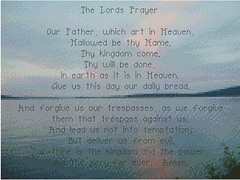
In this series on "The Lord's Prayer," I've been talking about how we are too selfish in the way we pray. The Lord's Prayer helps us to remember to pray: "Our Father." Our prayer is to be focused on God, not on ourselves. The God we pray to is holy, and has a name above all names. This God we pray to is the creator of all things, and has given us life and the world we live in.
Jesus then tells us to pray: "Thy kingdom come..."
The kingdom of God was central to the message of Jesus. When Jesus first appeared on the scene, He came “preaching the good news of the kingdom of God.” (Luke 4:43) But what does this mean?
It actually has 3 meanings; past, present, and future. In the past, we see the kingdom of God existing through Abraham, Isaac, and Jacob, and existing through the prophets. But it also had present meaning for Jesus. Jesus wanted us to know that the Kingdom of God was a present reality in Christ; it was here and now. And yet, the Kingdom of God also had future implications. There was an aspect of the Kingdom of God to come. It had meaning for when the end times would come; when heaven and earth would be done away with and a new heaven would come about. So Jesus, in using this phrase, tries to help us understand how the Kingdom can be past, present, and future.
To be in the Kingdom is to obey God’s will. The beauty of this understanding is that the Kingdom is not nations and countries, but you and me. We are each a part of the Kingdom, and together make up the Kingdom. The Kingdom makes a demand of us to give ourselves over to God’s will. It requires selflessness on our part; we must give up our selfish desires and wishes to be able to seek God’s will. It is only when we can each give up our will together, and join together in seeking God’s will, that the Kingdom of God can be seen here on earth. Which brings us next to seeing how God’s will comes to earth as it is in heaven, which I will talk about in my next blog.







